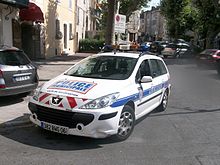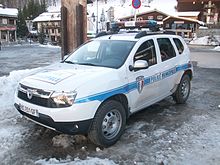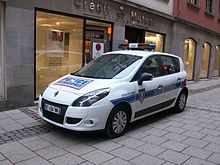- Municipal Police (France)
-
The Municipal Police (French: Police Municipale) are the local police of towns and cities in France. The French municipal police are under the direct authority of the Mayor, who is charged with significant powers of police administration, according to the regulations in Article L. 2212-2 du Code général des collectivités territoriales (CGCT) (2212-2 of the General Code of Territorial (CGCT)) with a responsibility to ensure good order, safety, security, and public health, and also to provide an administrative function, known as the "police power of the mayor. "
Although the word "police" refers to the maintenance of order, the function mainly comprises the protection of citizens from disasters, and the task of regulating traffic and parking. To do so, municipalities are required to establish municipal police services, under the authority of the mayor for the task of enforcing local bylaws.
Contents
Legislation
The mayor is chief of police for the territory of his/her mandate [1].
The general code regulating local authorities lays down the status of municipal police officers:
"Without prejudice to the general jurisdiction of the national police force and national gendarmerie, within the limits of their powers, the municipal police officers carry out duties required by the town council for crime prevention, public order, security, and public safety.
Without prejudice to the powers accorded them by special laws, they issue traffic fines and penalties for offences listed in Book VI of the penal code established by the Council of State and under the conditions laid down in paragraph 2 of section 21 of the Criminal Procedure Code and penal laws. They are also vested with powers to oversee infringements of Article L. 126-3 of the Code of Construction and Housing. During the course of their duties they act under the authority of the mayor of the municipality. " [1]
Activities
Interventions of the municipal police are also carried out in coordination with other police forces; a mandatory agreement defines and limits the nature and location of their interventions and the manner in which they collaborate with other police forces. With the exception of the static guarding of buildings and surveillance of ceremonies, festivals and other events, without this agreement, the tasks of local police can only be exercised between 6 am and 23 pm. Overall supervision and regulation of the municipal police is under the jurisdiction the Ministry of the Interior, which is empowered to carry out inspections by agencies such as the IGPN. Articles L 2212-5 (paragraph 4) [5] and the L CGCT 2212-9 [6], provide for inter-municipal police collaboration between municipalities or groups of municipalities; however, the police officers recruited through the municipal council are considered primarily available to every mayor in his hometown for local policing. They may also be required to be sworn in by the district judge to provide services to the national police of neighbouring districts or to the gendarmerie in rural areas. The municipal police do not generally carry firearms. At the request of the mayor however, the prefect of the department in which the commune or municipality is located may authorise municipal police officers to be armed in certain circumstances or for special night work. In some cities, all municipal police officers are permanently armed.
Strength and organization
The municipal police is officially recognized by the Ministry of Interior as the third component of the security forces after the National Police and the Gendarmerie [9] The city police has a code of ethics [10] and a business card [11]. Approximately 18,000 municipal police officers provide about 13% of the total French law enforcement community. In order to distinguish the municipal police [12] from other employees within category "A" of the civil service with the rank of Director of Municipal Police, rules of conduct, uniforms and the marking of vehicles were decreed in 2004 and 2005 and a framework for employment of localities of more than 40 officers was issued by decree on 17 November 2006) [13].
Since the law of 15 April 1999 The municipal police may also incorporate the duties of the forest rangers and game wardens (gardes champêtres) in rural areas.
Year Number of municipal policemen Number of municipalities
with municipal police1984 5 641 1 748 1987 8 159 2 345 1989 9 361 2 663 1993 10 977 2 849 1999 13 098 3 030 2004[2] 16 673 2010[3] 18 000 3 500 Skills
Under Article 21 2 of the Code of Criminal Procedure. the duties of the municipal police include:
- safety, security, safety and public order (L2212-5 of the code of local authorities)
- the correct application of the bylaws.
- monitoring and regulation of road traffic and the recording of traffic violations.(L116-2 of the code of the road traffic)
- routine screening for alcohol offenses under the traffic laws.
- maintenance of law 78-6 of the Code of Criminal Procedure.
- assistance to citizens of the town.
- the laws of urban planning.
- reporting of crimes over which they have no jurisdiction.
The municipal police may carry out arrests as part of the act (Article 73 of the Criminal Procedure Code) and are required to deliver any perpetrator to an officer of the national police or the national gendarmerie.
Notes and references
- ^ Article L. 2212-5 du CGCT 2212-5 of CGCT
- ^ http://www.police.online.fr/protocole/ Protocole d'accord relatif à la professionnalisation des polices municipales
- ^ Virginie Malochet, « Les polices municipales : points de repères », Note rapide, Institut d'aménagement et d'urbanisme, n° 515, septembre 2010
1. ↑ Code of Criminal Procedure art. 16, CGCT art. L2122-31.
2. ↑ Note: Section 21 of the Criminal Procedure Code confers municipal police officers with the status of deputy judicial police officers. As such, it empowers them to assist national police officers in the exercise of their duties, to report to their superiors any crimes, or offenses of which they have knowledge,and in accordance with the instructions of their superior officers, to discover and collect all information required for crime prevention and detection.
3. ↑ CGCT, art. L. 2212-6
4. ↑ CGCT, art. L. 2212-8
5. ↑ CGCT, art. L. 2212-5
6. ↑ CGCT, art. 2212-9
7. ↑ Art. L 412-49 of the Code of Commons.
8. ↑ Art. L 412-51 of the Code of Commons
9. ↑ First Municipal Fonts
10. ↑ Art. 412-53 of the Code of Commons
11. ↑ Decree 2006-1409 of 20 November 2006
12. ↑ Art L. Communes 412-52 of the Code of Commons
13. Note: These decrees, cataloged by a large municipal police officers, as being harmful to the profession, are challenged by the union USPPM who has appealed against the decrees in the Council of State
Bibliography
- Franck Denion, Police municipale : missions et moyens , Editions Territoriales, municipal police missions and means Territoriales Editions, June 2006.
See also
External links
- (fr) [1] Observatoire National des Polices Municipales (National Observatory Font Municipales)
- (fr) [2] Police Online Site non-officiel de la Police Municipale (Police Online Unofficial Website of the Municipal Police)
Categories:- Law enforcement agencies of France
- Municipal law enforcement agencies
Wikimedia Foundation. 2010.




